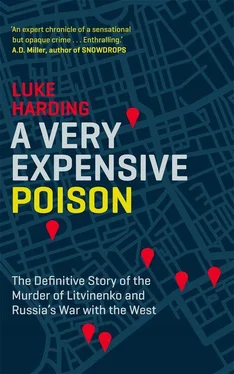She told detectives: ‘He drank a lot, which was eventually the reason for our separation, and in addition he hung about in Hamburg and on the Reeperbahn.’ In addition: ‘Dmitry wanted to be a porn star.’
The Reeperbahn where Kovtun spent his days was the city’s red-light district. The area in St Pauli had grown up to serve the needs of sailors visiting the port. In the pre-internet 1990s it was a street of peep shows, live sex acts and cinema booths, where you could toss a Deutschmark into a slot and view a minute of porn. The unknown Beatles played their first gigs here. Today, the Reeperbahn is more of a cuddly tourist destination than a house of sin. The last live sex theatre has closed; the sex shops are mostly gone; Andrew Lloyd Webber’s tame Cats was a fixture in its musical theatre.
Hohne was stupefied by the suggestion that her former husband would be involved in espionage or covert Russian intelligence work. ‘No, I cannot imagine that,’ she told police. He was, she said, temperamentally unsuited to complex projects of any kind. ‘He is not really the type for this, not the sort of person who does big deals or is suited in any way to this.’
Inne would characterise Kovtun as a dandy and one of life’s serial failures. ‘Dmitry is not particularly down to earth, more a man about town,’ Inna would tell the police. ‘He had all sorts of dreams and plans, none of which he realised, however.’ Kovtun was ‘not a particularly reliable type of person’, she recalled.
In 1994, Kovtun began seeing a Russian-German woman, Marina Wall. She had moved after the Soviet collapse with her family from Siberia to Germany. They married in 1996. Wall had affluent connections; this may have been part of the attraction. Marina’s doctor mother Eleanora works in Hamburg as a psychotherapist in an upmarket clinic. Eleanora and her wealthy partner Hartmut Kohnke own a string of rental properties in the city, divided into small flats and let mainly to students. Kovtun was named as ‘main tenant’ in one of the properties owned by Kohnke’s firm, Garant.
Despite having rich German in-laws, Kovtun failed to become prosperous himself. According to Litvinenko, he complained bitterly about how stingy they were. Kovtun told Litvinenko: ‘I am interested in money and money alone in this life. Nothing else.’ Kovtun said that his tight-fisted in-laws owned a ‘super expensive clinic in the centre of Hamburg and over 200 items of property’. They had bought nothing for him, he moaned, apart from a couple of package tours with his wife Marina. Kovtun told Litvinenko he ‘lived like a pauper’.
This was largely true. Kovtun’s mother-in-law, who retained a soft spot for Dmitry even after he became embroiled in scandal, confirmed: ‘Money and he didn’t go together.’ The shiny position Kovtun had been hoping for didn’t present itself. For a period Kovtun was on the dole, broke, and relying on German welfare handouts. Sometimes he picked up odd jobs. He worked as a refuse collector. He washed dishes in various Hamburg restaurants.
One of them was Il Porto. Il Porto was an Italian fish restaurant in Grosse Elbstrasse, in the heart of Hamburg’s waterfront tourist area, overlooking the Elbe and the city’s busy port. Opposite were the giant cranes of the German shipbuilder Blohm + Voss; from Il Porto’s pavement tables you could watch ships coming into harbour. Further west along the cobbled Elbstrasse is the Haifisch or Shark Bar, several old merchants’ houses and Hamburg’s 1960s-built commercial fish market. The restaurant occupied the ground floor of a renovated Jugendstil building. It had balconies and a mansard flat in the roof.
Kovtun worked at Il Porto between 1996 and 2001. The restaurant’s gregarious Italian owner Franco Schiavone employed him as assistant waiter. He wasn’t especially competent, but Shiavone liked him and kept him on. Kovtun’s German was poor. His main job was to collect the dirty plates.
Later Schiavone was a man with two stories – one he wanted to tell, and one he didn’t. Of Kovtun, he merely said: ‘I want to forget Dmitry.’ Schiavone was far happier talking about his own life and colourful career. As a young man in the swinging sixties he worked at La Dolce Vita restaurant in Soho, London, as well as in Swansea. He was a waiter in Paris and in Cannes, where a friend would smuggle him into press conferences with Hollywood stars. In 1978 he moved to Hamburg and later did a stint on a cruise liner. ‘My philosophy is, in life you have to keep moving,’ he told me.
Schiavone’s staff were international. His assistant waiter Kovtun was a Russian; his chef an Albanian. During this period Kovtun became friends with the Italian manager, who in the subsequent inquiry was referred to by the codename D3 in order to keep his anonymity. He would play a crucial role later in his story. D3 had hired Kovtun in 1996 when he turned up at Il Porto asking for a job. They played chess, and sometimes went for a beer after work. They kept in touch sporadically after D3 left Il Porto and moved on. ‘We talked about a lot of things,’ D3 said. Once, Kovtun gave D3 a present. It was a book on Niccolò Machiavelli, the Italian political philosopher. A sign of Kovtun’s intellectual interests? Or a fitting choice from a future assassin?
Il Porto was a business success. But in 2001 Hamburg city gave permission for a large and charmless office block to be constructed directly in front of the harbour. It blocked the restaurant’s ‘Elbblick’ – its picturesque view of the Elbe – killing off his custom. Schiavone shut Il Porto. ‘I practically gave it away,’ he said. He opened up another establishment, La Vela, down the road.
Out of a job, Kovtun harboured dreams of running his own business. In 2002, he and Marina Wall came up with the idea of a consultancy firm, advising Russians or Russian companies looking to set up in Germany. According to Wall, however: ‘The business did not materialise.’ By this point Wall and Kovtun were drifting in opposite directions. At the end of the year they separated; Kovtun stayed in her flat for a while, sleeping in a second bedroom. Wall met a new partner, a Pole, and became pregnant with their first child.
‘Dmitry could not sort himself out here. He did not find any work, he had been a high-ranking officer in Russia and could not prove himself here,’ Wall said. In 2003, after twelve years living in Germany, Kovtun decided to go back to Russia. During his absence the Kremlin had amnestied army deserters. His father had died in 1995; he moved back in with his mother. He was thirty-eight.
After the split, Kovtun remained on good terms with Marina, and with his German ex-mother-in-law, who lived with her partner in Haselau, a village 21 miles (35 km) north-west of Hamburg in Schleswig-Holstein. From time to time he would visit them. ‘Every woman finds Dmitry charming. It is just that he does not fancy working and he is not a family man,’ Wall said. ‘He is more a man about town. That is why we were not suited.’
* * *
And then suddenly, in 2005, as if by magic, Kovtun’s luck changed. He was back in touch with Lugovoi, his old friend from military school days. They were going into business together! While Kovtun had been scrubbing pots, Lugovoi had been accruing influence. And money. Lugovoi owned a security firm, Ninth Wave. He was providing bodyguards to VIPs. He had acquired a drinks factory too. Kovtun told Wall he was spending most of his time in Voronezh, doing vodka production with Lugovoi. They went cycling together, puffing up the slopes of Dombay, a mountain resort in southern Russia.
Was this rekindled friendship with Lugovoi only about business? Or something else?
In July 2006, Kovtun called Wall and said he would be visiting Hamburg. She and Kovtun were getting divorced; Kovtun was due to attend a hearing on 9 August. In the end, he didn’t make it. He told her his new Russian passport wasn’t ready. He would come soon, he said – in the autumn.
Читать дальше












